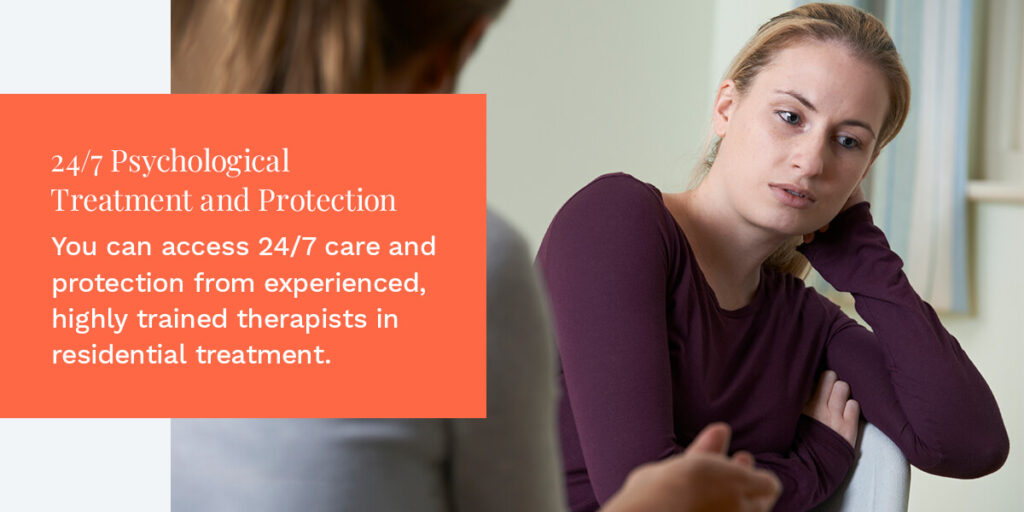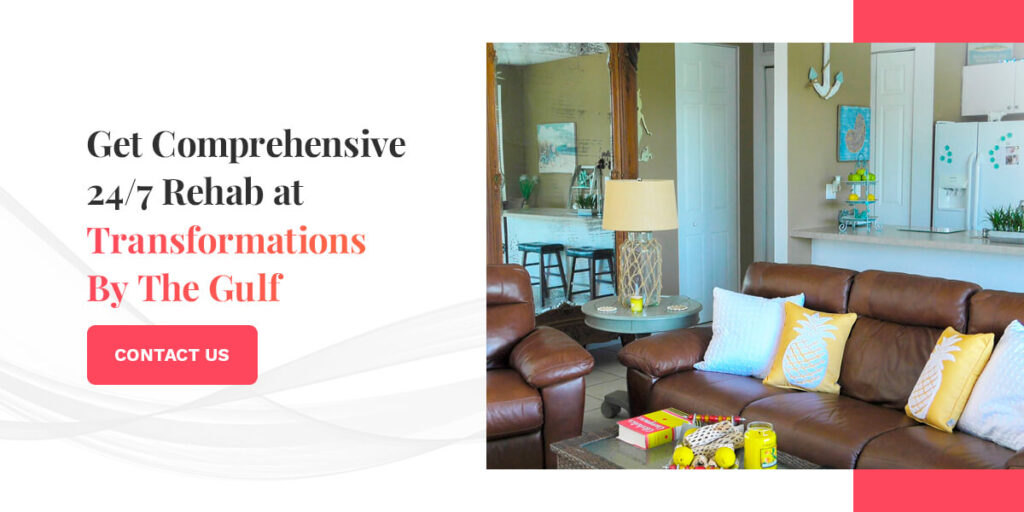Today, over 20 million Americans have substance use disorder and require help from some type of recovery program. While many people succeed in outpatient drug rehab centers, others appreciate the benefits of 24/7 inpatient rehab. Inpatient treatment provides a supervised setting with a team of addiction experts to help clients safely recover from substances and prevent relapse.
If you or a loved one is struggling with substance use disorder, know that you are not alone and recovery is possible. Keep reading to learn about the difference between inpatient and outpatient rehab and the benefits of 24/7 rehab.
What Is Inpatient or 24/7 Rehab?
Inpatient drug rehab centers, or 24/7 rehab, are places for people seeking help for drug or alcohol addiction, where they live full-time. Also called residential treatment, inpatient rehab is helpful for severe addictions and offers care 24 hours a day. It’s typically a non-hospital setting that provides a community of support and around-the-clock supervision for people recovering from substance use disorder.
The length of your stay varies depending on your needs, though the average time ranges from 30 to 90 days. Some clients might require a long-term 24/7 rehab to address their issues and meet treatment goals. While not appropriate for everyone, 24/7 rehab can be significantly helpful for many people with drug or alcohol addiction.
Treatment at 24/7 rehab typically consists of the following:
- Evidence-based clinical interventions
- Medications prescribed by physicians
- Holistic and traditional individual therapies
- Support groups
Inpatient treatment requires clients to live onsite and take time off work, family or school to get the help needed to recover from substance use disorder. Generally, the goals of 24/7 rehab are to keep you safe, help you recover and prevent relapse. The type of rehabilitation setting consists of health care providers, therapists and other addiction specialists. They are there to help you combat drug cravings and learn healthy coping mechanisms to avoid drug use. They also provide 24/7 medical assistance and mental health support to help you stay safe.
Inpatient vs. Outpatient Rehab
While addiction is often a chronic and complex health disorder, inpatient and outpatient programs can aid in your recovery. Both programs provide individual and group counseling programs to treat addiction and help you stay sober. The primary difference is inpatient, 24/4 rehab is offered in a supervised setting where you live full-time. At the same time, intensive outpatient programs (IOP) are typically attended just a few times a week during the day, so clients return home at night.
Neither plan is more effective or better than the other. The severity of your addiction and your unique needs will determine the type that’s appropriate for you.
24/7 rehab provides around-the-clock care and supervision, healthy foods and a comfortable place to rest your head at night. Outpatient rehab offers a more customizable approach, and factors such as your home and work life are considered to design the most effective recovery plan. Like inpatient rehab, professionals will track your progress throughout outpatient treatment and customize it for your needs.
7 Benefits of 24/7 Rehab
Inpatient rehab is most beneficial for those with severe addictions or co-occurring mental health conditions. It’s also helpful for those who lack an immediate local or experienced support system. The following are seven benefits of 24/7 rehab:
1. Medical Assistance for Withdrawal
One of the most significant benefits of 24/7 rehab is that it provides medical assistance for withdrawal. Detoxification programs involve safely and effectively removing substances from the body, usually through prescribed medications and other forms of therapy. Physicians will closely monitor you to ensure your safety and comfort to avoid withdrawal complications and help you begin the recovery process in inpatient rehab.
2. 24/7 Psychological Treatment and Protection
You can access 24/7 care and protection from experienced, highly trained therapists in residential treatment. It can be challenging to curb cravings and deal with life changes caused by substance use disorder. Therapists can help you reach goals and maintain sobriety by teaching healthy coping mechanisms and treating you for any co-occurring mental health disorders.
3. Community
One of the primary components of addiction treatment is the community created between staff, counselors and fellow recovering individuals. That’s one of the reasons 12-step programs like Alcohols Anonymous have success. In 24/7 rehab, you’ll have a support system of people who understand the struggles of addiction and can be a shoulder to lean on. These relationships are often crucial for recovery.
4. Structure
Structure and routine are essential for helping you recover from substances. Inpatient rehab programs emphasize creating daily routines with productive activities and counseling sessions to keep you engaged. Routine also helps eliminate distractions so you can focus on your sobriety. You’ll learn how to replace self-destructive activities with positive ones focused on healing.
5. Multiple Therapies and Treatments
Addiction is a mental and physical disease, and therapy is crucial for helping you understand your emotional triggers and develop new healthy coping techniques. With several types of treatments, inpatient rehab programs can help reduce your chances of relapsing and help you get back on track if it does happen. You’ll learn new attitudes, beliefs and behaviors concerning substance use and be encouraged to adopt a healthy lifestyle.
Some evidence-based therapies typically offered include:
- Cognitive-Behavioral Therapy (CBT)
- Contingency Management
- Family therapy
- Dialectal Behavioral Therapy (DBT)
- Eye Movement Desensitization and Reprocessing Therapy (EMDR)
6. Setting Goals and Building New Habits
In 24/7 rehab, counselors will help you set and accomplish goals. Building healthy habits is a critical part of self-care for a person in a recovery setting. Objectives will focus on your physical and emotional health, relationships and aspirations. Ultimately, it’s designed for your success after completing the program.
You’ll learn the tools needed to manage stress, avoid triggers and manage them when unavoidable to help prevent relapse.
7. Ongoing Support
The goal of inpatient rehab is to help clients engage in abstinence and recovery on a long-term basis, which is why many offer aftercare programs. You’ll often continue meeting with support groups and get recommendations for counselors after completing inpatient treatment, allowing you to get the ongoing recovery assistance you need after returning home.
For many, this step in the recovery process is one of the most crucial, as it helps you translate a successful addiction treatment into a successful future.
How to Know if You Need Inpatient Rehab
Everyone has unique requirements in addiction treatment, though generally, you might enter inpatient rehab if you:
- Are attempting to live sober for the first time
- Struggle with severe addiction and require medical detox
- Are a danger to yourself or others
- Have a non-supportive home life
- Have a co-occurring mental health disorder
- Have had no success with past outpatient programs or support groups
- Are worried about triggers or lack healthy coping tools
In 24/7 rehab, you’ll find a team of health providers, therapists, addiction specialists and peers eager to help you recover.
Get Comprehensive 24/7 Rehab at Transformations By The Gulf
Addiction treatment is often an ongoing process and one that you don’t have to go through alone. There are so many benefits of 24/7 rehab, including community, structure, medical support and aftercare.
Through inpatient treatment at Transformations By The Gulf, you’ll have 24/7 access to addiction specialists and medical professionals who want to see you recover and live a happier, healthier life. Our residential treatment programs offer a safe, homelike environment for recovery. We provide evidence-based therapies, medical assistance and holistic practices for comprehensive, personalized care for your needs.
To learn more about our inpatient rehab programs, contact us today.
If you or someone you know would like to know more about Transformations by the Gulf Substance Abuse Treatment Center Give us a Call 24/7 (727)498-6498
The success of a person’s recovery depends on the level of personalized treatment provided. It is important to find an addiction treatment program that works. When we say our treatment is individualized, we mean that we craft a program that is tailored to address the client’s unique physical, mental and emotional needs.
In the client’s first 24 hours with us, we’ll evaluate their current state and work to understand what challenges they need to overcome. They’ll also have an initial session with our doctor and meet with one of our licensed mental health professionals.
After the initial evaluations, we’ll design a treatment plan with the sole mission of helping the client overcome and heal from addiction. Their program will focus on things such as:
- Addressing and Identifying root causes of addiction.
- Creating a support system.
- Developing healthy stress management techniques.
- Eliminating Substance use.
- Learning how to communicate emotions effectively.
- Maintaining a healthier lifestyle.
- Repairing damaged relationships.
Our Facility is near the beach and offers a comfortable setting for substance abuse treatment and recovery.
What a Day is Like in Our Treatment Facility.
Why Transformations by the Gulf?

